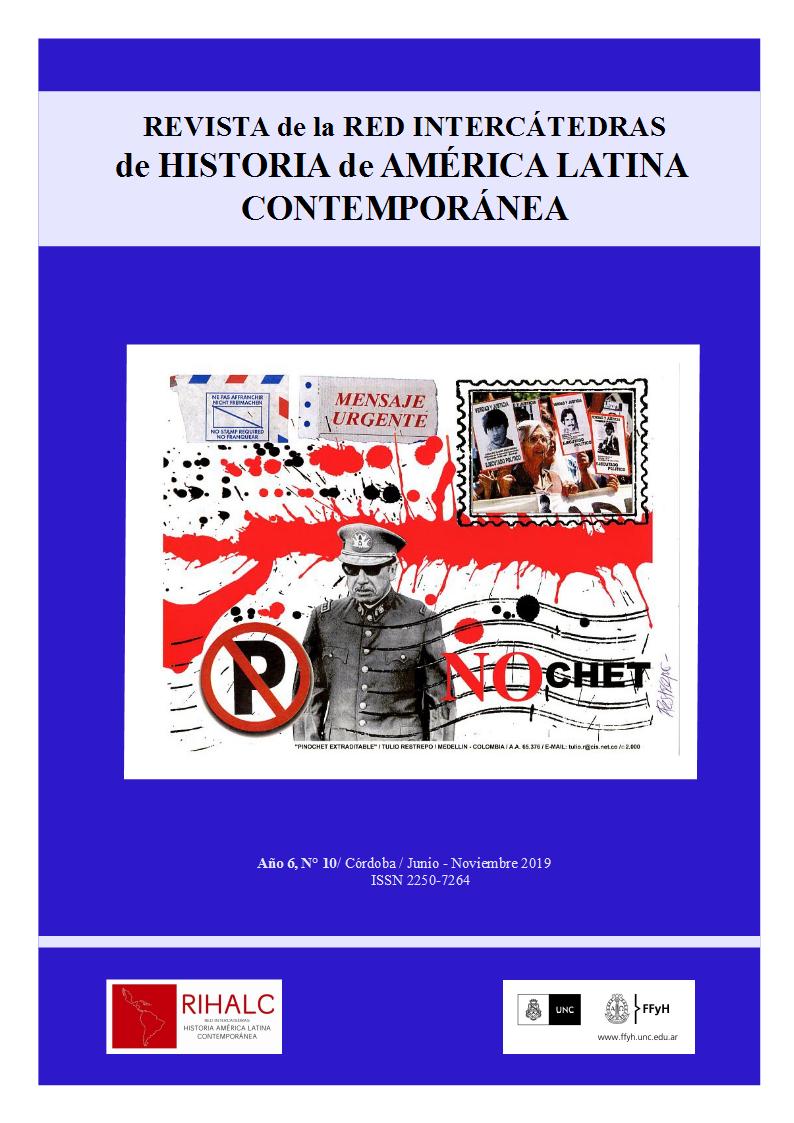Revolution in a single country? Henry Christophe and the diffusion of the Haitian revolutionary ideology in the Atlantic World
Keywords:
Haitian Revolution, Henry Christophe, Influence in the Atlantic WorldAbstract
In this paper I propose to analyze the foreign policy of Henry Christophe, as President and as King of the North of Haiti from 1807-1820. Inparticular, I am interested in studying his relations with the hegemonic powers and how he spread the ideology of the Haitian revolution in the Atlantic world. One of my hypotheses is that while he maintained a determined anti-colonial stance against France, and a neutral stance with Spain, he maintained a strong alliance with England. The first is explained as a continuation of the pro-independence feat and as a defensive policy against the constant threat of recolonization by the former metropolis. The second, as an attempt not to generate conflicts with a neighbouring power. And the third, as a pragmatic and ideological alliance, because England was not only the main enemy of France, but had become a promoter of the abolition of the slave trade in the world. In addition, I try to demonstrate that, although Henry Christophe maintained an isolationist rhetoric, he sought to spread the Haitian revolution beyond the borders of his country. He pursued this policy through the seizure of slave ships, the promotion of African-American immigration to Haiti, the attempt to buy Santo Domingo and the promotion of an intellectual campaign against the slave culture, colonial and racist prevailing in his time. Thus, indirectly and without jeopardizing the nascent state, he tried to continue and expand Haiti's revolutionary ideology.
References
Archivos
Archivo General de Indias, (AGI)
Archivo General de la Nación de Colombia. (AGNC)
Archivo General de la Nación de Venezuela. (AGN)
Archivo del Libertador (AL)
Diarios
The Bermuda Royal Gazette
La Gazette Royale D´Hayti
Libros, Artículos y Documentos Publicados
Arends, Tulio (1986): La República de las Floridas 1817-1816, Academia Nacional de la Historia, Caracas.
Ardouin, Beaubrun (1853): Étude sur l'Histoire d'Haïti, 11 tomos, Dezorby et E. Magdeleine, Paris.
Boisrond Tonnerre, Louis (1851): Memoires pour servir a l’historie de Haïti, Libraire, Paris.
Bongie, Chris (2014): “Jean Louis Vastey (1781-1820): A Biographical Sketch”, en Vastey, Jean Louis (autor) y Bongie, Chris (editor), The Colonial System Unveiled, Liverpool University Press, Liverpool, pp. 11-26.
Bongie, Chris (2015): “The Cry of History: Juste Chanlatte and the Unsettling (Presence) of Race in Early Haitian Literature”, MLN, 130, pp. 807- 835.
Brown, Jonathan (1837): The History and Present Condition of Santo Domingo, William Marshall and CO, Philadelphia.
Cole, Hubert (1967): Christophe King of Haiti, The Viking Press, New York.
Cordero Michel, Emilio (2000): La Revolución Haitiana y Santo Domingo, Universidad Abierta para Adultos, Santo Domingo.
Cortázar, Roberto; Cuervo, Luis (comp.), (1925): Congreso de 1825, Imprenta Nacional, Bogotá.
Daut, Marlene (2014): “Monstrous Testimony: Baron de Vastey and the politics of Black Memory” en Vastey, Jean Louis (autor) y Bongie, Chris (editor), The Colonial System Unveiled, Liverpool University Press, Liverpool, pp. 173-210.
Daut, Marlene (2012): “The Alpha and Omega of Haitian Literature: Baron de Vastey and the US audience of the Haitian political writing”. Comparative Literature, N°1, Vol. 64, pp. 49-72.
Daut, Marlene (2009): “Un-Silencing the Past: Boisrond-Tonnerre, Vastey, and the Re-Writing of the Haitian Revolution, 1805-1817”, South Atlantic Review, N°1, Vol. 74, pp. 35-64.
Daut, Marlene (2017): Baron de Vastey and Origins of the Black Atlantic Humanism. Palgrave Macmillan, New York.
Davis Robinson, William (1820): Memoirs of the Mexican Revolution, Lydia R. Bailey, Philadelphia.
Dubois, Laurent (2012): Haití: The Aftershocks of History, Metropolitan Books, New York.
Esterquest, Ralph (1940): “L´Imprierie Royale D´Hayti(1817-1819). A little known royal press of the western hemisphere”, The Papers of the Bibliographical Society of America, N°2, Vol. 34, pp. 171-184
Fanning, Sara (2014): Caribbean Crossings: African American and the Haitian emigration movement, New York University Press, New York.
Ferrer, Ada (2012): “Haití, Free Soil, and Antislavery in the Revolutionary Altantic”, The American Historical Review, N°1, Vol. 117, pp.40-66.
Ferrer, Ada (2014): Freedom´s Mirror: Cuba and Haiti in the Age of Revolution, Cambridge Universiyr Press, New York.
Franco, José Luciano (comp.) (1954): Documentos para la Historia de Haití en el Archivo Nacional de Cuba, Archivo Nacional de Cuba, La Habana.
Franco, José Luciano (2012): Revoluciones y conflictos internacionales en el Caribe 11789-1854, Archivo General de la Nación, Santo Domingo.
Franklin, James (1828): The present state of Hayti, Murray, London.
Gaffield, Julia (2015): Haitian Connections in the Atlantic World, University of North Carolina Press, Chapell Hill.
Girard Phillipe (2016): “Did Dessalines plan to export the revolution?”, Gaffield Julia (editor), The Haitian Declaration of Independence, University of Virginia Press, Charlostsville, pp.136-160.
Garraway, Doris, (2012):“Empire of Freedom, Kingdom of Civilization: Henry Christophe, the Baron de Vastey, and the Paradoxes of Universalism in Postrevolutionary Haiti”, Small Axe, N°39, Vol. 16,pp. 1-21.
Garraway, Doris (2014): “Abolition, Sentiment and the problem of Agency in Le Systeme Colonial Dévoilé” en Vastey, Jean Louis (autor) y Bongie, Chris (editor), The Colonial System Unveiled, Liverpool University Press, Liverpool, pp. 211-246.
Garraway, Doris (2017): “Black Athena in Haiti: Universal History, Colonization, and the African Origins of Civilization in postrevolutionary Haitian writing”, Trioire, Damien, (editor), Enlightened Colonialism, Palgrave Macmillan, London, pp. 287-308
Geggus, David (2002): Haitian Revolutionary Studies, Indiana University Press, Bloomington.
Gonzalez, Jonhenry (2015): “Defiant Haiti: Free-Soil Runaways, Ship Seizures and the Politics of Diplomatic Non-Recognition in the Early Nineteenth Century”, Slavery & Abolition, 2015 N°1, Vol. 36, pp. 124–135
Griggs, Earl y Prator, Christopher (eds), (1952): Henry Christophe & Thomas Clarkson; a Correspondence, University of California Press, Berkley.
Harvey, William. (1827): Sketches of Hayti, L.B. Seeley and Son, London,
Janvier, Louis Joseph (1886): Les Constitutions D´Haiti, II tomos, C. Marpon y E. Flammario, Paris.
Julián, Amadeo (1994): “La política exterior de España y las relaciones entre la Colonia Española de Santo Domingo y Haití 1806-1820”, Clio, N°151, pp. 43-90.
Lepkowski, Tadeusz (1960): Haití, II tomos, Casa de las Américas, La Habana.
Madiou, Thomas (1848): Histoire D’Haiti, III Tomos, Jh Courtouis, Port au Prince.
Martínez Peria, Juan Francisco (2012): ¡Libertad o Muerte! Historia de la Revolución Haitiana, Ediciones del Centro Cultural de la Cooperación, Buenos Aires.
Mackenzie, Charles (1830): Notes on Haiti, Henry Colburn and Richard Bentley, London.
Nesbitt, Nick (2013): Caribbean Critique: Antillean Critical Theory from Toussaint to Glissant, Liverpool University Press, Liverpool.
Nesbitt, Nick, Daut, Marlene (2014): “Vastey and the System of Colonial Violence”, en Vastey, Jean Louis (autor) y Bongie, Chris (editor), The Colonial System Unveiled, Liverpool University Press, Liverpool, pp. 285-300.
Nicholls, David (1996): From Dessalines to Duvalier: Race, color and National Independence in Haiti, New Jersey, Rutgers Univeristy Press.
Pérez Morales, Edgardo (2012): El gran diablo hecho barco: Corsarios, esclavizados y revolución en Cartagena y el Gran Caribe, Universidad Industrial de Santander, Bucaramanga.
Pradine, Linstant (1886): Recueil general des lois et actes de gouvernement D´Haiti, A. Durand et Pédone-Lauriel, Paris.
Prevost, Julién, (1811): Relation des glorieux e?ve?nements qui ont porte? Leurs Majeste?s Royales sur le tro?ne d'Hayti, Chez P Roux Imprimeur du Roi, Cap Henry.
Quevilly, Laurent (2014): Le Baron de Vastey: La voix des esclaves, Books on Demand, Paris.
Racine, Karen (1999): “Britania´s Bold Brother”, Journal of Caribbean History, N°1-2 Vol. 33, pp. 125-145.
Rafter, Michael (1820): Memoirs of Gregor Mac Gregor, Printed for J.J. Stockdale, London.
Saunders, Prince (1816): Haytian Papers, T. Bensley and Son, London.
Sherman, John (1808): A general account of Miranda´s expedition, McFarlane and Long, New York.
Saint Rémy, Joseph (1855): Petión et Haïti, Chez L´Auteur, Paris.
Vandercook, John (1943): Majestad Negra: La vida de Christophe, Rey de Haití, Sociedad Impresora Americana, Buenos Aires.
Vastey, Jean Louis, (1814): Le Systeme colonial dévoilé, Chez P. Roux Imprimeur du Roi, Cap Henry.
Vastey, Jean Louis, (1816): Réflexions sur une lettre de Mazères : ex-colon français, adressée à M. J.C.L. Sismonde de Sismondi, Chez P. Roux Imprimeur du Roi, Cap Henry.
Vastey, Jean Louis (1817): Réflexions Politiques sur quelques Ouvrages et Journaux Français Concernant Haïti, D L´Imprimier Royale, Sans Souci.
Vastey, Jean Louis (1823): An Essay on the causes of the revolution and the civil war of Haiti, Western Luminary, Exeter.
Verginaud, Leconte, (1931): Henry Christophe Dans L´Histoire D´Haïti, Éditions Berger Levrault, París.
Verna, Paul (1983): Petión y Bolívar, Ediciones de la Presidencia de la Nación, Caracas.
Von Grafenstein, Johanna (1997): Nueva España en el Circuncaribe 1779-1808: Revolución, competencia imperial y vínculos intercoloniales, Universidad Nacional Autónoma de México México DF.
White, Arthur (1975): “Prince Saunders: An Instance of Social Mobility Among Antebellum New England Blacks”, The Journal of Negro History, N°4, Vol. 60, No. 4, pp. 526-535
Zavits, Erin (2017): “Revolutionary Narrations: Early Haitian historiography and the Challenger of writing counter history”, Atlantic Studies, N°23, Vol. 14, pp. 336-353.
Downloads
Published
Issue
Section
License
Aquellos autores/as que tengan publicaciones con esta revista, aceptan los términos siguientes:
- Los autores/as conservarán sus derechos de autor y garantizarán a la revista el derecho de primera publicación de su obra, el cuál estará simultáneamente sujeto a la Licencia de reconocimiento de Creative Commons que permite la libre distribución con mención de su(s) creadores, no permite el uso comercial ni las obras derivadas. Los autores, al enviar el artículo, acuerdan publicarlo bajo esta licencia..
- Los autores/as podrán adoptar otros acuerdos de licencia no exclusiva de distribución de la versión de la obra publicada (p. ej.: depositarla en un archivo telemático institucional o publicarla en un volumen monográfico) siempre que se indique la publicación inicial en esta revista.
- Se permite y recomienda a los autores/as difundir su obra a través de Internet (p. ej.: en archivos telemáticos institucionales o en su página web) después del proceso de publicación.



